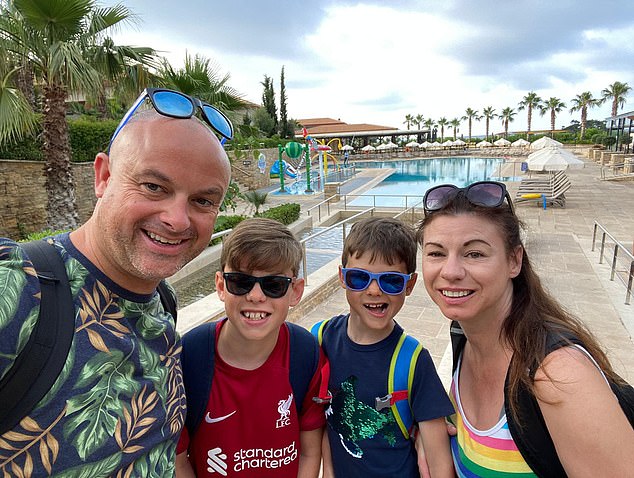I’m so sensitive to loud noises that they hurt me: Karen’s surprisingly common condition has devastated her life, but is often misdiagnosed. This is an everyday event that she believes caused it
Karen Cook not only hates loud noises, she thinks they hurt – so much so that conversations with her two sons, aged twelve and eight, can only be had in whispers, telephone conversations are impossible and even the sound of a boiling kettle is too many.
Karen, 50, is so sensitive to everyday noises that going out now becomes too painful for her and she has been housebound for two years.
“On better days I can whisper and shower,” she says. “On my worst days, I can’t get dressed or leave my bedroom, even if I wear earplugs and earmuffs all day.”
Karen suffers from a little-known but surprisingly common condition called hyperacusis. Those affected find normal sounds so loud that they experience discomfort or even pain.
For some, loud noises such as fireworks can be unbearable, but for those who are severely affected, like Karen, even harmless everyday noises are unbearable.
Before this happened, Karen worked as a cabin crew and enjoyed a good social life. Then, in the fall of 2021, she started hearing buzzing sounds in her ear and within months she started finding noise physically painful.
“My life as I knew it ceased to exist in August 2022,” says Karen, who lives with her husband Nick in Southport, Merseyside. That was the day her pain started and now, “Every sound – wind, rain, passing cars – is too much for me.”
According to the charity Tinnitus UK, hyperacusis affects around 2 percent of the adult population, although some research suggests many more people may be affected.
Karen Cook, 50, with her husband Nick. The couple live in Southport, Merseyside
It’s more common in women than men, but the cause isn’t always clear, says Dr. Arun Pajaniappane, an audiovestibular doctor at the Harley Street Audiovestibular Clinic.
This is more likely to happen in people who already have some hearing loss, he says, possibly because this then causes “excessive amplification of sounds through the auditory pathways to the brain,” meaning moderate sounds can become loud sounds for those affected.
‘It has also been linked to problems in the middle ear, such as problems with the ossicles (middle ear bones) where they fuse, as well as migraines, stress and head injuries,’ he says.
People with autism or other neurodevelopmental disorders are also more likely to be affected.
Hyperacusis can occur alongside tinnitus, where those affected may hear a buzzing or ringing sound without any apparent source, in one or both ears.
It differs from misophonia, in which certain sounds evoke strong emotions (such as irritation caused by the sound of someone eating), but not the pain that occurs with hyperacusis.
For Karen, hyperacusis has had such an impact on her life that she even considered ending it, she says. This is not unheard of, says Dr. Pajaniappane. “Unfortunately, this condition can cause significant distress,” he says. And the fact that it can be misdiagnosed can contribute to that, he adds.
Before she was diagnosed, Karen’s symptoms were attributed to everything from “menopause to depression and anxiety – none of which applies to me,” she says.

Karen with her husband Nick and two sons aged twelve and eight

According to the charity Tinnitus UK, hyperacusis affects around 2 percent of adults
In the autumn of 2021, she first sought help from her GP after developing ‘weird tinnitus’. She describes it as “a high-pitched ‘eeee’ sound in my left ear, but it was only present when there were other sounds and not in silence.”
In December, Karen was referred to an ENT doctor, who was as confused by her symptoms as she was, “because people usually hear their tinnitus more silently and use sound to mask the tinnitus.”
Karen was told that it would probably work out in time, but it got worse. “My tinnitus responded to more and more sounds,” she recalls, and while it was usually a hissing sound, “the worst of it, a sound like a burglar alarm, goes through my head.”
She later discovered that she has “sound-sensitive tinnitus” (tinnitus that occurs in the presence of sound and not in silence), as well as hyperacusis. The circumstances affect both of Karen’s ears.
Karen visited several doctors and specialists as her condition worsened. She was told it was likely the anxiety made it worse. “I tried to explain that I had no fear at all,” she says, “but no one ever listened to me.”
The diagnosis of anxiety is common in patients with hyperacusis, but Dr. Pajaniappane emphasizes that while anxiety and depression have been found to often occur in combination with hyperacusis, they are not the main cause of the symptoms.
In June 2022, Karen also began experiencing sporadic pain.
“It was like a burning sensation deep in my ears, as if someone had lit a match and put it there,” she says.
Her doctor prescribed antibiotics, but over the following weeks the pain became more intense and chronic. More antibiotics, ibuprofen and paracetamol did not help. “Just hours of being alone in my bedroom can ease the pain,” says Karen.
It wasn’t until she saw another ENT specialist in February 2023 that she received her diagnosis. The suggestion is that previous damage to her hearing, although not causing hearing loss at the time, may have played a role.
“I was in a car accident in 2013 and the airbag deployed,” she says. ‘The noise from a deployment is around 140 decibels, a level that can cause hearing damage.’ She also worked on noisy aircraft for many years.
The condition is usually diagnosed by ruling out other causes, using hearing tests, and checking the eardrum. “Only one test, known as the loudness discomfort level test, can specifically assess for hyperacusis,” says Dr. Pajaniappane.
During the examination, a patient hears a series of beeps at different frequencies that gradually increase in volume: they press a button or say “stop” when the sound becomes uncomfortably loud. However, because the severity of symptoms can vary from day to day, “this limits the usefulness of the test,” says Dr. Pajaniappane.
NHS treatment for hyperacusis is limited to cognitive behavioral therapy (CBT), a form of talk therapy.
Dr. Pajaniappane says this can be effective for some patients, adding that treating underlying ear conditions – ‘for example if there is hearing loss, hearing aids or surgery to treat middle ear problems’ – can help.
‘Medications for migraines, antidepressants and short-term sedative benzodiazepines to manage the pain caused by the condition all have a role to play as part of a multi-faceted treatment.’
Karen has explored multiple treatments, but her condition has only worsened. She has tried painkillers, homeopathy, acupuncture, nerve blocks (injections of anesthesia to target the nerves), supplements and cognitive behavioral therapy.
“Now virtually any sound triggers my pain and reactive tinnitus, regardless of volume and frequency,” she says. ‘For the past year I have also had pain all over my head and scalp, as well as pressure and pain in my mouth. It’s terrible. I communicate with my family by whispering when I am able, texting or writing.”
She spends most of her time in her bedroom reading or watching TV on mute, with closed captions.
“The hardest thing for me, and for many others, is that my voice works, I hear well, but I can’t talk because the noise causes me more pain and tinnitus,” says Karen. ‘This is also not something you can push through. Believe me, I tried.’
She adds: ‘I’m happiest on my better days, when the pain and tinnitus are at their lowest and I can quietly cuddle and whisper briefly with my children – but I’ve missed every milestone in their lives for over two years. missed. years now and becoming more limited with every month.
‘I miss the simple things: going to school and taking my children to their sports activities, laughing and having fun. All those little things that make us human.’
